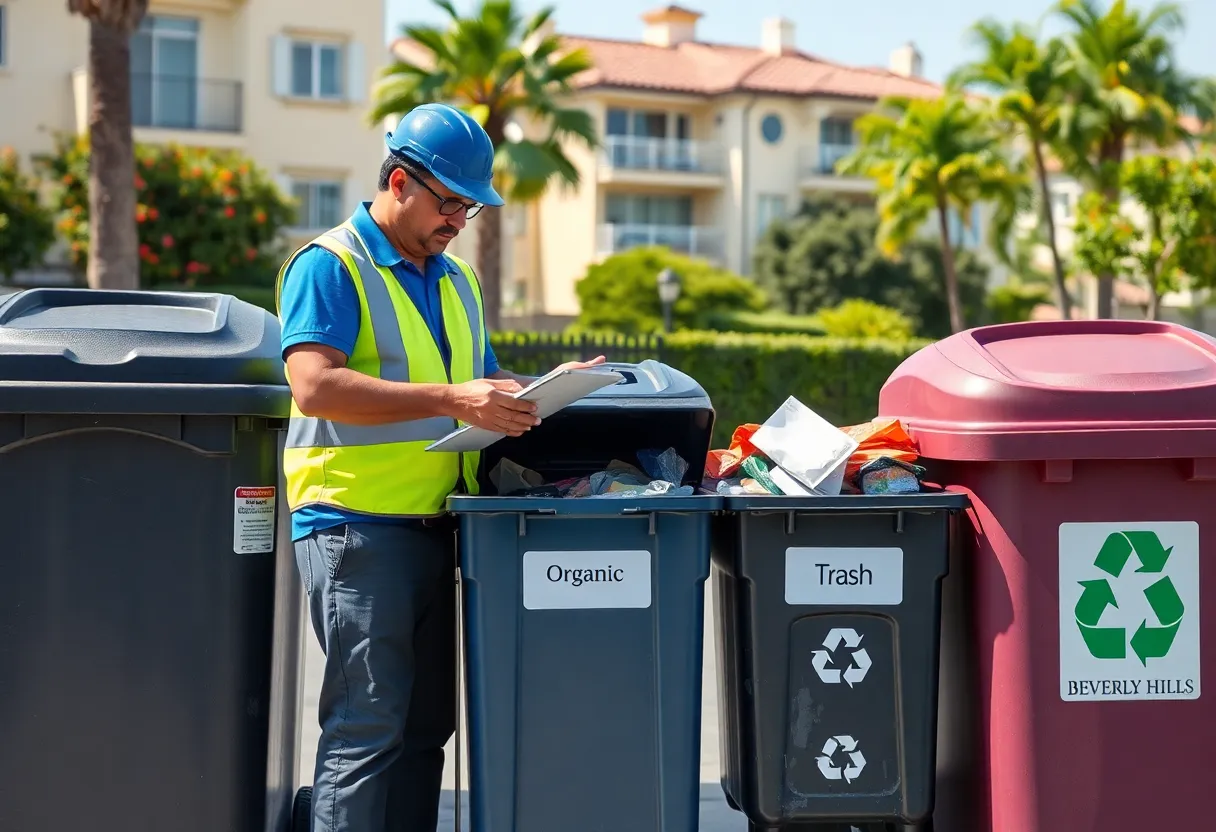News Summary
Beverly Hills has launched waste container audits as part of enforcing mandatory organic waste separation in compliance with California’s Senate Bill 1383. Residents are required to sort food scraps, yard waste, and food-soiled paper from their trash. The Public Works Department inspects bins, tagging compliant containers positively and marking non-compliant ones. With initiatives like providing free 2-gallon food scrap pails, the city aims to increase awareness and compliance. Educational outreach and monitoring will continue as enforcement begins in 2024, promoting sustainability and waste reduction within the community.
Beverly Hills has begun conducting waste container audits to enforce mandatory organic waste separation as outlined in California’s Senate Bill 1383. This initiative is a response to the growing need to address organic waste management and comply with state regulations, which have been in effect since January 1, 2022.
The audits, initiated by the city’s Public Works Department in October, involve inspecting residents’ waste containers to ensure compliance with the organic waste collection program. The program requires that all California residents separate food scraps, yard waste, and food-soiled paper from their regular trash and recyclables. In Beverly Hills, residents utilize two bins: a green one for organic waste and a black one for recyclables and non-recyclables.
As part of the audit process, Public Works staff check the top layer of refuse in the green and black bins. Containers that meet the compliance standards receive a “good job” tag, while those that do not are marked with an “oops” tag. Future audits may expand to include opening bags within containers to ensure proper sorting.
The separation of organic waste from trash is essential, as stated in Senate Bill 1383, which was signed into law in 2016 by former Governor Jerry Brown. The legislation aims to reduce short-lived climate pollutants, particularly methane emissions resulting from organic waste in landfills. By diverting compostable materials away from waste sites to composting facilities or fuel conversion processes, the program aims to limit environmental pollution.
Since the mandatory separation of organic waste began, compliance has been slower than anticipated. Factors contributing to this include a general lack of awareness among residents regarding the necessity of these regulations and associated deadlines, as well as setbacks related to the COVID-19 pandemic.
The city has taken measures to support compliance, including providing free 2-gallon food scrap pails to residents. These pails are intended to assist households in collecting organic waste effectively, which includes all edible items, garden waste, and food-stained paper products (excluding wax-coated containers). The Public Works Department continues to distribute these scrap pails and organizes compost giveaway events throughout the year to encourage participation in the program.
In contrast to Beverly Hills’s dual-bin system, nearby cities like West Hollywood and Los Angeles employ a three-bin system, which includes bins for green, blue, and black waste separation. This difference in approach illustrates the varying methods cities are employing to meet California’s organic waste management goals.
On October 7, the Los Angeles City Council raised trash collection fees for certain residences, which will impact the overall budget for trash collection across nearby communities. Despite these changes, Beverly Hills remains committed to advancing organic waste recycling initiatives, having previously collected organic waste from large restaurants for over a decade.
Looking ahead, Beverly Hills plans to implement educational outreach and compliance monitoring in line with SB 1383, with formal enforcement scheduled to commence in 2024. This proactive approach is aimed at increasing awareness while improving participation in waste separation efforts.
According to Public Works Director Shana Epstein, compost created from organic waste contributes significantly to improved soil health by providing essential nutrients and enhancing water absorption capabilities. These environmental benefits are part of a broader strategy to promote sustainability and waste reduction within the community.
As the city moves forward with its organic waste initiatives, community awareness and engagement will be central to success, ensuring all residents understand the importance and requirements of the waste separation program.
Deeper Dive: News & Info About This Topic
HERE Resources
Additional Resources
- Beverly Press
- Wikipedia: Organic waste
- Beverly Hills Courier
- Google Search: Organic waste management
- NBC Los Angeles
- Google Scholar: California Senate Bill 1383
- Fine Dining Lovers
- Encyclopedia Britannica: Waste Management

Author: STAFF HERE BEVERLY HILLS WRITER
The Beverly Hills Staff Writer represents the experienced team at HEREBeverlyHills.com, your go-to source for actionable local news and information in Beverly Hills, Los Angeles County, and beyond. Specializing in "news you can use," we cover essential topics like product reviews for personal and business needs, local business directories, politics, real estate trends, neighborhood insights, and state news affecting the area—with deep expertise drawn from years of dedicated reporting and strong community input, including local press releases and business updates. We deliver top reporting on high-value events such as the Rodeo Drive Concours d'Elegance, the Beverly Hills artSHOW, Concerts on Canon, and holiday celebrations throughout the city. Our coverage extends to key organizations like the Beverly Hills Chamber of Commerce and Visit Beverly Hills, plus leading businesses in luxury fashion, hospitality, and entertainment that drive the local economy. As part of the broader HERE network, including HERELosAngeles.com, HERESantaAna.com, HEREHuntingtonBeach.com, and HERECostaMesa.com, we provide comprehensive, credible insights into Southern California's dynamic landscape.




